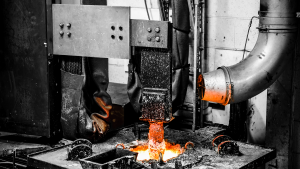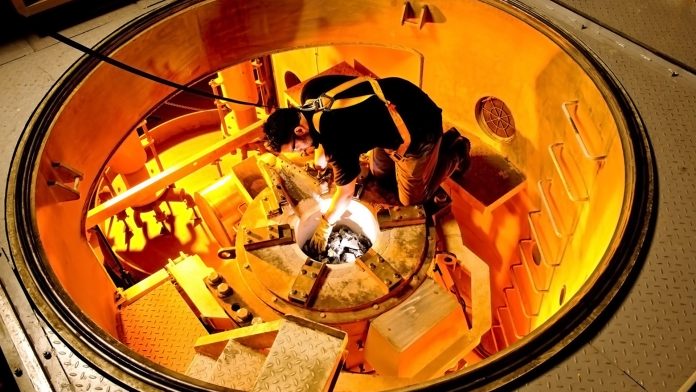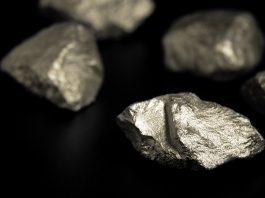How a UK company situated in the midstream is paving the way for an alternative supply chain with metal and alloy production in the Western World.
Nestled in Ellesmere Port, in the North-West of England, you can find an alloy production facility key to the UK Green Revolution, offering a complementary supply chain alternative.
Founded in 1992, Less Common Metals (LCM) is a world leader in manufacturing and supplying complex alloy systems and metals. With over 30 years of experience producing tight compositional tolerances and controlled microstructures, LCM offers a range of innovative products. In the last year, the company has invested in its technical department to bolster its expertise across various technical advancements.
Inside the factory, you can expect to see a whopping 6,200m² of shop floor housing six standard vacuum induction furnaces, three resistance heated furnaces, two strip casters, two full-sized electrolytic cells to produce rare earth metals from molten salts, a hydrogen decrepitation furnace, various crushers, mills, and other metal processing equipment, and a fully equipped, dedicated analytical laboratory.
As I’m sure you are aware, historically, China has held a dominant position in the global rare earth market as the country is gifted with ‘geological greatness’, which enables easy access to reserves. The Chinese Government has also invested a lot of capital into research and development and, in recent years, state-of-the-art equipment that enables advancements. China’s share in the rare earth market has varied throughout the years but has rarely dropped below 80%. Reuters recently reported that China controls 95% of the production and supply of rare earth metals.
Overdependence on a single source risks supply becoming weaponised, and holds enormous geopolitical pressures. With China dominating the rare earth industry, it leaves a strategic vulnerability with potential disruptions and an erratic supply of materials and products.
Dysprosium (Dy) and Terbium (Tb) are heavy rare earth elements (HREEs), also known as the ‘heavies’. They are essential for improving the performance of neodymium magnets, the strongest commercial permanent magnets available. LCM recently announced the expansion of metal-making production to dysprosium iron (DyFe) and terbium (Tb) to further enhance their expertise as a complementary supply chain alternative. LCM is actively securing committed offtake agreements for commercial scale volumes for DyFe metal aimed to be supplied at approximately 30 tonnes per annum and Tb metal volume at 30 tonnes per annum initially.
The company’s technical process developments to date are in the fields of samarium cobalt (SmCo), co-reduced SmCo, neodymium iron boron (NdFeB), metallurgical reductions, strip casting, electrolysis, and hydrogen decrepitation. Progressing ahead, the technical department is focusing on the production of terbium and dysprosium (Tb/Dy) metal, neodymium praseodymium (NdPr), dysprosium iron (DyFe), samarium (Sm) and developing a scandium (Sc) production route.
Electrolysis
Molten salt electrolysis is the industry standard for making rare earth metals in NdFeB magnet production. Since 2017, LCM has made neodymium (Nd) and neodymium praseodymium (NdPr) metal commercially on their premises in the UK at over 120 tonnes per annum.
Without good control of the process and effective treatment of emissions, molten salt electrolysis has the potential to be highly damaging to the environment due to the use of fluoride and gaseous emissions, including CO2.
However, by installing a wet scrubber system to process off-gases, the LCM process operates well within the limits imposed on emissions by the UK Environment Agency.
NdFeB strip cast alloys
The established technology for alloy production for sintered NdFeB magnets is strip casting. Raw materials are melted in a vacuum, and the molten alloy is passed over a water-cooled rotating copper wheel.
LCM is the only western-world company currently strip casting NdFeB alloys on a commercial scale, with two 600kg scale furnaces giving a capacity of around 1,400 tpa of alloys. LCM now offers strip cast quantities as low as 100kg per composition. This will benefit the magnet market by assisting with small-quantity bespoke compositions to enable product development at a reduced cost.
NdFeB magnets are the most powerful permanent magnets commercially available. They are used in DC motors, sensors, chemical couplings, and pumps.
In recent years, there has been significant growth in green technologies requiring NdFeB magnets, including electric vehicles and wind power generation. LCM enjoys exclusive European representation as a leading Chinese producer of bonded magnetic powders.
Isotropic magnetic powders can be used to produce bonded NdFeB magnets through amalgamation. Anisotropic magnetic powders can be used to produce bonded magnets with maximum energy products twice that of the isotropic bonded magnets.
Hydrogen storage
Hydrogen storage alloys can absorb 1,000 times their volume in hydrogen, making them a favourable choice for green energy. With a long storage lifespan, the opportunities for these alloys are vast; they can be used to power various establishments such as factories, universities, residential areas, hotels, and commercial buildings.
Hydrogen storage alloys, also known as metal hydrides, can store and release hydrogen gas through hydrogen absorption and desorption. These alloys typically comprise metals such as titanium, zirconium, magnesium, and rare earth elements like lanthanum.
As a supporter of green energy and a decarbonised economy, LCM currently provides the industry with hydrogen storage material. Alongside this, LCM is proud to work with a PhD student from Nottingham University to further enhance the company’s offering and progress research into sustainable hydrogen alloys.
LCM continues to support PhD research as this plays a key role in producing solid-state hydrogen for partners worldwide.

Samarium cobalt alloy powders
Samarium cobalt alloy powders are a type of rare earth magnet material. The alloy production process is called co-reduction, which involves the reaction of mixed oxide with a reductant metal at elevated temperatures by induction melting. The resulting alloy is then crushed and milled to produce a fine powder.
The co-reduction process involves heating the mixed oxide and reductant metal together until they melt and react, diffusing atoms through the solid state and forming the desired alloy, after which it is crushed and milled to produce the power.
LCM is one of a few manufacturers globally producing SmCo alloy powders using this process. It is advantageous because it produces a more homogeneous and fine-grained powder than other methods, resulting in improved magnetic properties and performance in the final magnet production.
Benefits of specialty alloys
Specialty alloys offer a range of benefits due to their unique compositions and properties tailored to specific applications. LCM’s technical team engineers these alloys to demonstrate exceptional performance characteristics that standard alloys may not possess. Some of the benefits of specialty alloys include:
- Enhanced performance: Designed to excel in specific environments, conditions, or applications;
- Corrosion resistance: Formulated to resist corrosion in aggressive environments where standard alloys might fail;
- High-temperature stability: Mechanical strength and other properties maintained at elevated temperatures. Suitable for applications in high-temperature environments such as aerospace, power generation, and industrial processes;
- Wear resistance: Suitable for components subjected to abrasive or erosive conditions, such as cutting tools, bearings, and industrial machinery parts;
- Magnetic properties: Engineered to exhibit specific magnetic properties, including high magnetic permeability, low coercivity, and excellent magnetic retention. Vital for applications such as electrical transformers and magnetic sensors;
- Lightweight construction: Some specialty alloys have been developed to combine high strength with low weight, making them valuable for applications where weight savings are essential, such as in the aerospace and automotive industries; and
- Customisability: Speciality alloys can be customised to meet specific requirements, allowing engineers to fine-tune properties for optimal performance in particular applications.
LCM labs
The Less Common Metals laboratory is an inorganic analytical laboratory equipped to test the elemental composition, microstructure, and physical properties of inorganic materials. It primarily acts as the quality control (QC) department for producing metal alloys but can perform commercial analysis on various inorganic materials.
Through elemental, crystallography, metallography, and physical characterisation analysis, a range of industries can be serviced, such as aerospace, automotive, electronics, metals, batteries, and chemicals. Our team of analytical chemists uses various apparatus depending on the testing required:
- Elemental analysis (ICP-OES);
- Metallography (Optical, SEM-EDX);
- Crystallography (XRD); and
- Physical testing (PSD, thickness).
The team offers a 48-hour express service to analyse those samples you just can’t wait for. For all other analyses, ten working days is standard.
LCM’s growth strategy
LCM has strategically positioned itself for robust growth through a multi-faceted approach. Central to its expansion strategy is the emphasis on building strategic partnerships. LCM recognises the value of collaboration in today’s interconnected business landscape and has sought alliances with key players across the supply chain. These partnerships enhance LCM’s technological capabilities and market reach and foster innovation through shared resources and expertise.
Another pivotal aspect of LCM’s growth strategy is its commitment to offtake agreements. By securing long-term contracts with suppliers, LCM ensures a stable product demand. This commitment mitigates market uncertainties and provides a solid foundation for investment in capacity expansion and technological advancements. It solidifies LCM’s position as a reliable supplier in the industry.
LCM strategically facilitates a Western supply chain to bolster its growth further. This involves optimising logistics, distribution, and manufacturing processes to streamline operations. LCM aims to enhance its competitiveness and responsiveness to customer demands by establishing a more efficient alternative supply chain in Western markets.
This forward-thinking approach acknowledges the evolving dynamics of the global business environment, including geopolitical shifts and market fluctuations. By diversifying its supply chain, LCM aims to enhance resilience against disruptions, ensuring a continuous and reliable flow of materials and products.
In summary, the company’s growth strategy encompasses collaborative partnerships, committed offtake agreements, optimisation of the Western world supply chain, and exploring alternative supply chain models. The company is positioning itself for sustained success in a dynamic and competitive marketplace through these strategic initiatives.
Please note, this article will also appear in the seventeenth edition of our quarterly publication.









